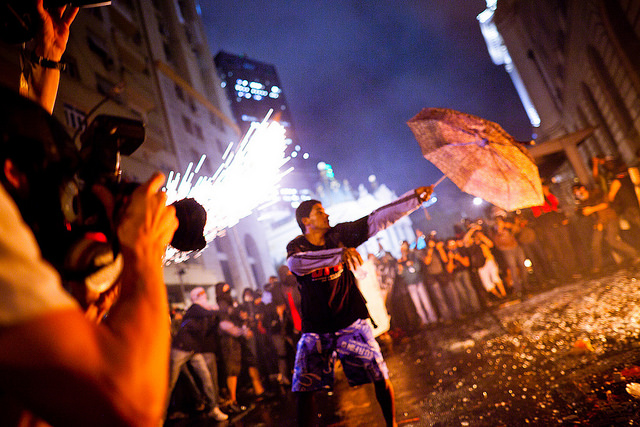The ‘Umbrella Revolution’ – Did It Accomplish Anything?

 Images of thousands of protestors – the majority of them young professionals and students – have been splashed across the front pages of newspapers around the world over the past few weeks. Students wearing surgical masks and goggles and holding flimsy umbrellas in the face of pepper spray and police brutality made headlines. While protests have shrunk in recent days and negotiations have begun with Hong Kong’s government, some media sources have even speculated that this could become a second ‘Tiananmen Square‘.
Images of thousands of protestors – the majority of them young professionals and students – have been splashed across the front pages of newspapers around the world over the past few weeks. Students wearing surgical masks and goggles and holding flimsy umbrellas in the face of pepper spray and police brutality made headlines. While protests have shrunk in recent days and negotiations have begun with Hong Kong’s government, some media sources have even speculated that this could become a second ‘Tiananmen Square‘.
Those that participated in the movement are optimistic in what they believe the protests have accomplished. Representatives of the movement claim that they have opened a new platform for dialogue between Beijing and Hong Kong. Arguing that the movement successfully applied pressure on the Chinese central government, protestors state that “all gates were closed before” but things are now changing. Optimism is great, recognizing the efforts that brought together thousands of people to fight for true democracy and popular representation is fantastic, peaceful protest in the face of police brutality is commendable. I’m putting a disclaimer right now, this article does not mean to belittle or undermine the significance of popular movement for democracy. However, all the inspiring images aside, one must critically ask the key question – did the protest truly accomplish something?
The Chinese government has made it clear that it does not intend to change its policies towards the quasi-democratic system in Hong Kong, a relic of the British colonial period. The number of protestors is dwindling, but Beijing’s stance remains just as obstinate as it was two weeks ago. As more students return to work and school, as the news of students being pepper-sprayed, struggling against the police and facing off against angry government supporters falls out of the news cycle, the visible voice of Hong Kong protestors will inevitably diminish.
From China’s perspective, it cannot afford to change its stance and suddenly denounce its own definiton of “democracy” as inaccurate. This is not because the leaders of the central government believes that the Chinese Communist Party can do no wrong, but because liberalizing concessions in Hong Kong could spark similar movements for autonomy or sovereign governance among China’s countless minority groups, satellite regions and even the increasingly restless cities.
The protests were significant in a number of ways. It demonstrated to the Beijing government that many of Hong Kong’s people are not satisfied with the ‘democratic’ system they have, and that the people are willing to join mass popular movements to voice their disagreement. The sheer size of the protest also captured the world’s attention, attracting more people than ever before to take a second look at the flawed transition process that “repatriated” Hong Kong to China from the United Kingdom. The protests also showed how polite and studious the Hong Kong demonstrators were, cleaning up the streets, recycling garbage and even doing their homework while boycotting classes to demand democracy. It gave rise to a young generation of political activists (however temporary their activism may be) that neither Hong Kong nor China knew existed.
Will more people pay attention to China’s political dynamics with Hong Kong from now on? Most likely, yes. Will this influence how China decides to act? Most likely not. Those that are devoted to the idea of fighting for their beliefs are not so concerned about whether their political goal is realistically obtainable. As Paul Cheung, a protestor, said in an interview with The New York Times:
Belief is the only reason to be here [at the protest], even if it’s not realistic belief.
However, for the remaining thousands that were hoping to obtain true democracy through this protest, a fact is unfortunate but true: they will need something more than umbrellas and polite demands to persuade the Chinese government to give them their freedom.
